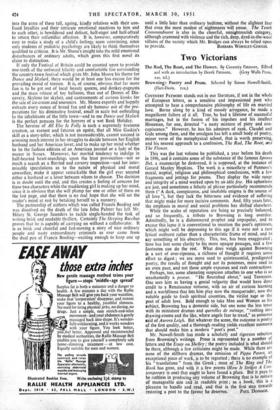Two Victorians
The Rod, The Root, and The Flower. By Coventry Patmore. Edited Browning: Poetry and Prose. Selected by Simon Nowell-Smith.
(I lart-Da v is. 2 I S.) COVENTRY PATMORE stands out in our literature, if not in the whole of European letters, as a sensitive and impassioned poet who attempted to base a comprehensive philosophy of life on married love. Borne along by a kind of moody arrogance, he made a magnificent failure of it all. True, he had a lifetime of successful marriages, but in the fusion of his impulses and his intellect Housman, for one, detected " a nasty mixture of piety and con- cupiscence." However, he has his admirers of rank, Claude! and Gide among them, and the amalgam has left a small body of poetry, minor verse of the metaphysical school, that is worth preserving, and his nearest approach to a confession, The Rod, The Root, and The Flower.
This was the last volume he published, a year before his death in 1896, and it contains some of the substance of the famous Sponsa Del, a manuscript he destroyed, it is supposed, at the instance of Gerard Manley Hopkins. The work is a miscellany of Patmore's moral, nuptial, religious and philosophical conclusions, with a few fragments and jottings for poems. They display the wide range and integrity of a mind worked upon by an idee fixe. His aphorisms are just, and sometimes a felicity of phrase particularly recommends them (" A dark, conspicuous, and insoluble enigma is the source of all love "), but they lack the bitterness and evidence of suffering that might make for more incisive comments. And, fifty years later, the emphasis in moral and social problems has shifted elsewhere.
While the scales of reputation are being so precisely balanced, and so frequently, a tribute to Browning is long overdue. Admittedly, he is a dishonoured prophet and unpopular, and to excuse this lapse it is conventional to mention the poet's optimism, which might well be depressing to this age if it were not a rare lyrical outburst rather than a characteristic frame of mind, and to say something of his obscurity. This, too, has been exaggerated ; time has lent some clarity to his more opaque passages, and a few footnotes can do the rest. What does weigh against Browning is a sort of over-ripeness, a richness of thought it requires some effort to digest ; we are more used to quintessential, predigested poetry, the results of thought and not its processes, more used to an even pace, and not those ample expanses and rash contractions.
Perhaps, too, some alienating suspicion attaches to one who is so unashamedly a poseur. " He flourished about," said Tennyson. One sees him as having a genial vulgarity that would have done credit to a Renaissance virtuoso, with an air of curious learning and a worldliness that lets him play now the masquerader, now the voluble guide to fresh spiritual countries, the virilist sage or the poet of adult love. Bold enough to take Men and Women as his subject, Browning has a domestic side, but one none the less tense with its miniature dramas and querelles de menage, "rushing into drawing-rooms and the like, where angels fear to tread," as someone said of Aurora Leigh. But whatever the scene, the outcome is poetry of the first quality, and a thorough reading yields excellent moments that should make him a modern " poet's poet." Mr. Nowell-Smith has made a scholarly and rigorous selection from Browning's writings. Prose is represented by a number of letters and the Essay on Shelley ; the poetry included is what should be there, although a few criticisms might be made. While there are none of the stillborn dramas, the omission of Pippa Passes, an exceptional piece of work, is to be regretted ; there is no example of his " translations " from the Greek ; most of The Ring and The Book has gone, and with it a few poems (How It Strikes A Con- temporary is one) that ought to have found a place. But it pays to be ruthless in producing any volume of Browning that is to remain of manageable size and in readable print ; as a book, this is a pleasure to handle and read, and that is the first step towards restoring a poet to the favour he deserves. PAUL DINNAGE.






























 Previous page
Previous page